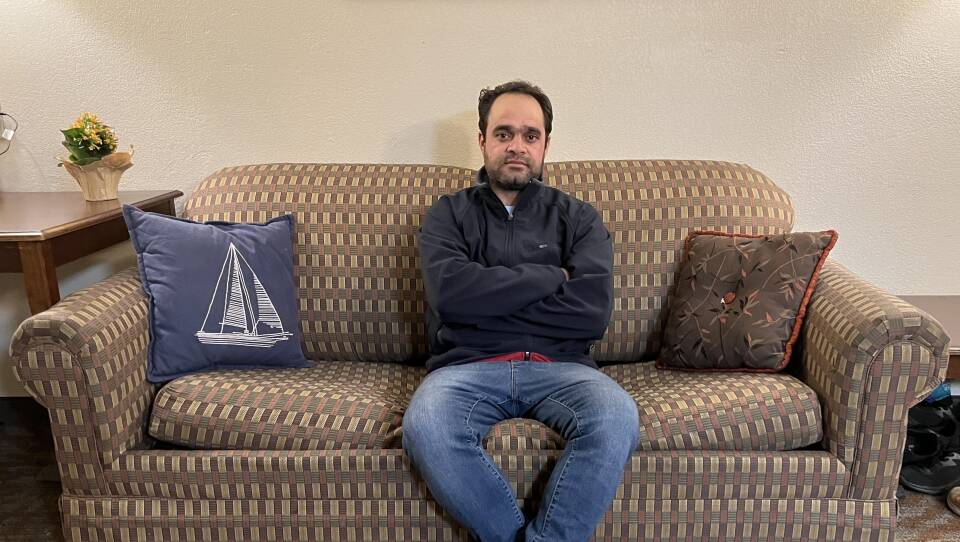In his room at a Quality Inn hotel in Worcester, Abdullah helps his four daughters pack their school bags before they head to weekly tutoring. His youngest daughter, who is seven, is so excited she can’t stop smiling. Abudullah smiles back and says goodbye before they return later that evening.
Abdullah and his family have been in the U.S. for about three months after fleeing Afghanistan late last summer when the country fell to the Taliban. GBH News is omitting his last name, and those for the other evacuees in this story, because they have relatives who remain in Afghanistan and fear they could face persecution from the Taliban.
The militant group has already killed Abdullah’s brother-in-law, who was a police officer, and his wife’s mother recently died of a stress-induced heart attack — a broken heart from all the fear and grief, Abdullah said.
“Everyday, when I’m calling with my father and mother, [we’re] just crying. They want to get out of Afghanistan. We cannot do anything,” he said.
For now, Abdullah is focused on what he can do: helping his daughters continue their education and creating a new life in the United States.
Abdullah and his family are among more than 600 Afghans who've arrived in Central Massachusetts in recent months as part of the U.S. government’s effort to resettle tens of thousands of evacuees around the country after the airlift out of Afghanistan last summer.
Overall, state officials say 1,887 Afghans have relocated to Massachusetts with some going to cities like Boston, New Bedford and Lowell. But state resettlement agencies are directing many to the Worcester area because the region has more jobs and a lower cost of living than other parts of Massachusetts. Worcester also has a decades-long history of welcoming refugees from around the world.
“So there has been a network of support in place for refugee resettlement,” said Meg Gallo, a community specialist with the Massachusetts-based Refugee and Immigrant Assistance Center. “There’s principals and teachers that are trained, working with kids if they speak little or no English.”
Many of the Afghan evacuees are known as humanitarian parolees, meaning they are not yet eligible for the same benefits as people under refugee status. The City of Worcester, the United Way of Central Massachusetts and other organizations have been helping to fill the void, raising more than $1 million to pay for housing, food and other services. Local non-profits are also helping evacuees acclimate to life in Massachusetts.
Every night at the Quality Inn hotel, where nearly 300 Afghans are currently living as they wait to move into apartments, staff with Ansaar of Worcester, a non-profit agency, spend hours assisting them with job applications, setting up doctor’s appointments and addressing any other problems they’re experiencing. Ansaar staff hope to gain the evacuees’ trust.
Mona Ives, Ansaar's president, said many of the Afghans are frustrated about losing everything they had in their home country, including their jobs, homes and cars. At the same time, they have built-up trauma from decades of war in Afghanistan and their experiences fleeing the Taliban.
“So it’s not just about knocking on the door and being like, ‘Here we have extra clothes, we have extra blankets,’” Ives said. “It’s also about getting to know them. Listening to them cry in fear for their families.”

For most evacuees, their arrival in the Worcester area ends weeks of uncertainty about where they will resettle. After fleeing Afghanistan, many spent months living in tents on military bases, first overseas, then in the U.S.
“More than a thousand people were in one tent. Hot also,” said Abdullah, who spent about three months on an Air Force base in New Mexico. “But at least nobody was there to kill us.”
Still, the Afghans are nervous about their future in Massachusetts. When the Taliban captured the country, an evacuee named Gul went into hiding for two weeks, fearing for his life because he worked with Western military forces. Although he’s safe now, he’s afraid he’ll struggle to find a job around Worcester because he doesn’t speak English.
“I have a family over here and a family back home that I have to be responsible for and send money to,” Gul said through an interpretor. “How am I going to make an earning here?... If I need to go somewhere, I cannot even talk to a taxi guy where I need to go.”
The other challenge has been securing long-term housing. Refugee agencies are co-signing and helping the Afghans pay rent until they find stable jobs. However, many landlords refuse to accept evacuees because they don’t have a credit history. The cost of housing also keeps increasing.
“We need to be sure that we're placing people in apartments they're going to be able to afford once they start working,” Gallo said. “We started receiving refugee arrivals in October. Just in the last couple months, we’ve been dealing with landlords who are asking $200, $300, $400 more a month on the rent.”

The limited affordable housing is forcing the agencies to sometimes settle for apartments that need maintenance work, but volunteers try to make up for that. During a recent tour of one apartment before the evacuees moved in, Jennifer Frye of the Welcoming Alliance for Refugee Ministry pointed to the microwave and freezer covered with old food stains. She suspected the previous tenant left some bottles of root beer in the freezer that exploded.
A few days later, the appliances looked brand new. Frye and her team of volunteers had spent days deep-cleaning the apartment, installing curtains, adding furniture and fixing anything else that was broken.
When two Afghan families finally moved in, they said they couldn’t be happier about the apartment. Seven months after leaving Afghanistan, they had a home again.
“I have everything over here,” an evacuee named Somya said about her new residence. “Thank you so much to everyone.”







